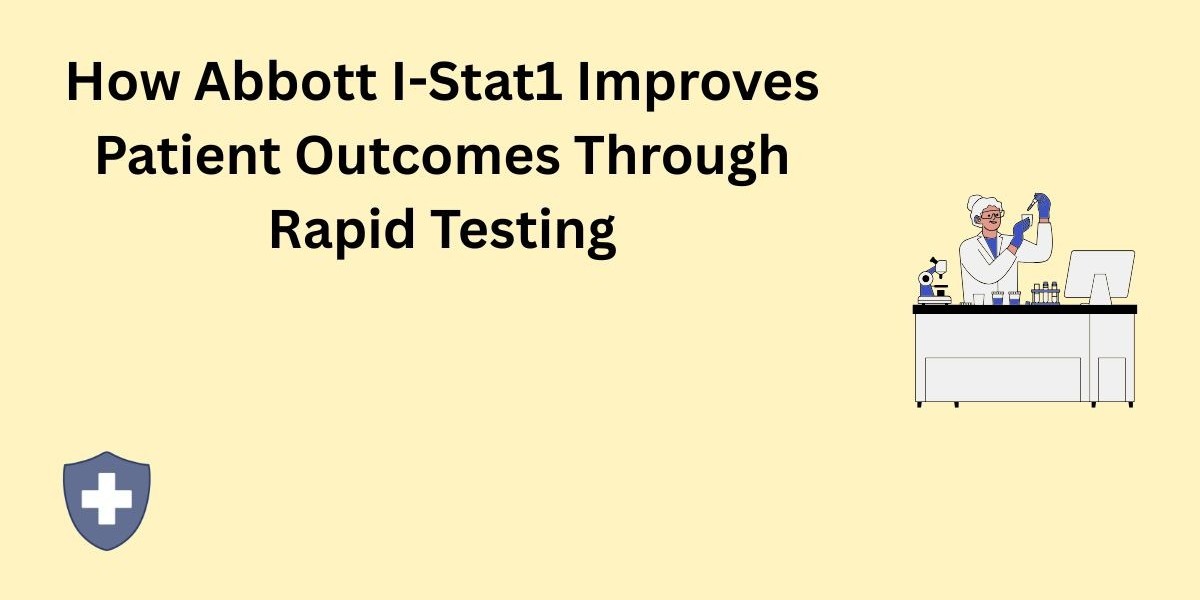In modern healthcare, the demand for quick and reliable diagnostic results continues to rise. The Abbott I-Stat1 is a compact and portable testing system that allows healthcare professionals to perform high-quality diagnostics directly at the patient’s side. This handheld analyzer provides laboratory-grade results within minutes, helping clinicians make faster and more informed decisions. By reducing turnaround times and improving workflow efficiency, the Abbott I-Stat1 plays a crucial role in enhancing patient outcomes across hospitals, clinics, and emergency care environments.
Understanding the Importance of Point-of-Care Testing
Timely access to accurate diagnostic information is essential in emergency and critical care. Traditional laboratory testing often involves several steps including sample transportation and data processing, which can delay treatment decisions. The Abbott I-Stat1 eliminates these delays by performing immediate analyses wherever the patient is located. This system enables physicians to begin treatment faster, improving the likelihood of positive outcomes and reducing the length of hospital stays.
Point-of-care testing provided by the Abbott I-Stat1 is especially beneficial in settings where quick decision-making is vital. Whether in emergency departments, intensive care units, or remote clinics, it supports better clinical judgment by delivering immediate, actionable data.
Overview of the Abbott I-Stat1 System
The Abbott I-Stat1 is a portable blood analyzer designed for use at the point of care. It uses small, single-use cartridges that contain the necessary reagents for specific tests. These cartridges can measure various analytes including blood gases, electrolytes, glucose, lactate, and cardiac markers. Each test requires only a few drops of blood, which are placed directly into the cartridge for analysis.
The device’s lightweight design makes it easy to carry and operate in any clinical environment. Its battery-powered function ensures continuous use even in areas without access to stable electricity, making it ideal for field hospitals, ambulances, and rural healthcare centers.
How the Abbott I-Stat1 Works
The technology behind the Abbott I-Stat1 is based on microfluidics and advanced sensor systems. Once a blood sample is introduced into a cartridge, it flows through microchannels where it interacts with embedded sensors that detect specific biochemical reactions. The analyzer then interprets the data and displays results within a few minutes on its built-in screen.
This process eliminates the need for sample preparation or complex calibration. The ease of use makes it possible for nurses, physicians, and paramedics to operate the device without extensive laboratory training.
Comprehensive Test Menu for Diverse Clinical Needs
One of the major strengths of the Abbott I-Stat1 is its extensive test menu that covers multiple diagnostic categories. It can perform blood gas analysis, electrolyte measurement, renal function tests, and cardiac marker evaluations, among others. This range of testing options allows healthcare facilities to consolidate diagnostics into a single system, reducing the need for multiple instruments.
Clinicians can use the Abbott I-Stat1 to monitor patients in real time, guiding treatment decisions more efficiently. The versatility of the device makes it suitable for emergency medicine, critical care, operating rooms, and even outpatient monitoring.
Enhancing Accuracy and Reliability
Accuracy is a core requirement for any diagnostic system. The Abbott I-Stat1 maintains precision comparable to centralized laboratory analyzers through advanced quality control and calibration features. The cartridges are pre-calibrated, reducing variability between tests and ensuring reproducible results.
Each test run includes built-in checks that verify proper cartridge function and instrument performance. This ensures that clinicians can trust the data when making time-sensitive decisions, particularly in cases involving cardiac arrest, electrolyte imbalance, or respiratory distress.
Small Sample Volume and Minimal Invasiveness
The Abbott I-Stat1 requires only a minimal blood sample, typically less than 100 microliters. This is particularly beneficial for pediatric and neonatal patients where blood conservation is crucial. By reducing the volume of blood required, the system minimizes patient discomfort and allows for frequent monitoring without causing stress or harm.
The simplicity of sample collection also decreases the risk of contamination or handling errors, leading to more consistent and reliable results.
Integration with Hospital Information Systems
Modern laboratories and hospitals rely on seamless data flow between devices and electronic medical records. The Abbott I-Stat1 is designed to integrate smoothly with laboratory information systems and hospital networks. This connectivity allows test results to be automatically uploaded to patient records, eliminating manual data entry and improving data accuracy.
By maintaining synchronized and secure patient information, healthcare facilities can ensure compliance with regulatory standards and streamline workflow efficiency.
Supporting Critical and Emergency Care
In emergency medicine, time is often the most important factor. The Abbott I-Stat1 provides immediate access to diagnostic data for patients experiencing trauma, heart attacks, or respiratory failure. Clinicians can assess critical parameters such as oxygen levels, pH balance, and cardiac enzyme concentrations within minutes.
The analyzer’s portability allows it to be used in ambulances or at the bedside, ensuring continuous monitoring throughout the patient’s journey. This immediate feedback enables rapid therapeutic intervention and improves survival rates in critical conditions.
Reliability in Remote and Resource-Limited Settings
Healthcare providers working in remote or resource-limited environments face unique challenges, including limited access to central laboratories. The Abbott I-Stat1 overcomes these limitations by offering reliable diagnostics in compact form. Its durable construction withstands harsh environmental conditions, while its battery operation ensures functionality in areas without reliable power sources.
By extending laboratory-quality testing capabilities to these regions, the device helps reduce healthcare disparities and supports timely medical intervention in underserved communities.
Operational Efficiency and Cost Benefits
While the Abbott I-Stat1 enhances diagnostic speed and accuracy, it also contributes to cost efficiency. By reducing the need for laboratory infrastructure, specimen transport, and repeated testing, healthcare institutions can optimize their resources. The reduction in turnaround time translates to faster patient throughput, better bed management, and lower operational costs.
Furthermore, fewer manual steps mean reduced labor costs and fewer opportunities for human error, improving overall service quality.
Ease of Use and Training
One of the major advantages of the Abbott I-Stat1 is its simple and intuitive design. It requires minimal training, allowing a wide range of healthcare professionals to use it confidently. The interface provides step-by-step instructions, making the testing process easy to follow even under stressful conditions.
This simplicity not only reduces operator error but also enables hospitals to deploy the analyzer across multiple departments without additional staffing requirements.
Environmental Considerations and Sustainability
The cartridges used in the Abbott I-Stat1 are designed for single use, minimizing cross-contamination and biohazard risks. Additionally, the system’s compact design and efficient reagent use help reduce waste and energy consumption. Many healthcare organizations value this eco-friendly approach as part of their sustainability efforts.
Conclusion:
The Abbott I-Stat1 represents a significant advancement in point-of-care testing, combining speed, accuracy, and convenience in one compact device. Its ability to deliver laboratory-quality results directly at the patient’s side transforms how healthcare professionals diagnose and treat critical conditions. By improving workflow efficiency, supporting rapid decision-making, and enabling testing in virtually any location, the Abbott I-Stat1 directly contributes to better patient outcomes and higher standards of care. For hospitals, emergency services, and clinics worldwide, it remains one of the most trusted and versatile diagnostic solutions available today.








